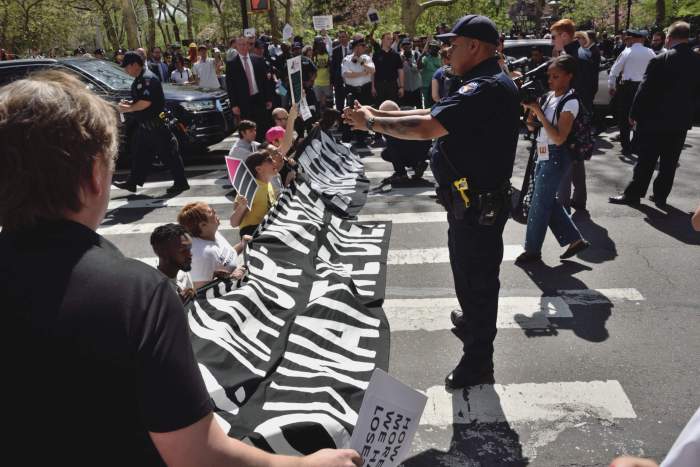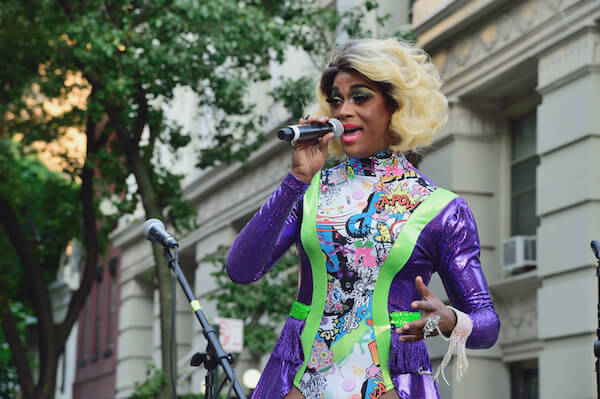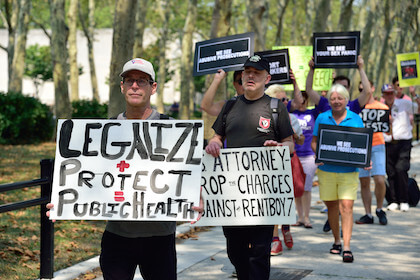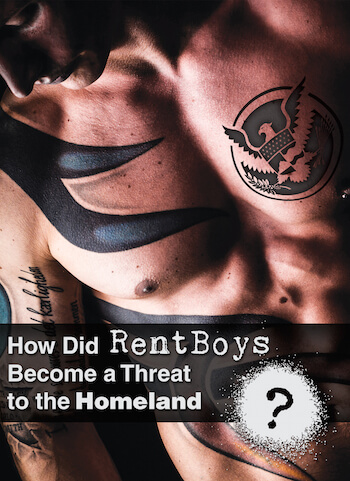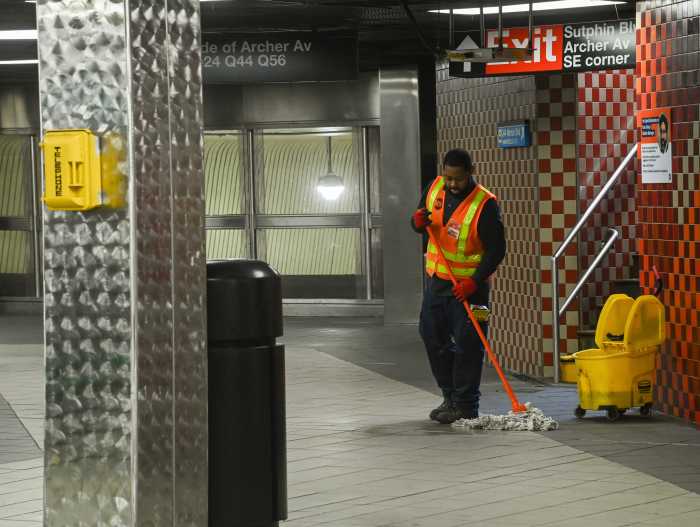Incumbent District Attorney Cyrus Vance, Jr., is seeking a third four-term on November 7. | CYVANCEFORDA.COM
When Gay City New sat down with District Attorney Cyrus Vance, Jr., in early September for an interview currently airing on Manhattan Neighborhood Network (www.youtube.com/watch?v=RHgiKX7lsl0 0r bottom of this story), the two-term incumbent seemed headed toward an unopposed and decidedly non-controversial reelection.
Vance discussed a variety of issues, some of which highlighted progressive reforms he’s championed since assuming office in 2010 — including diversion of a significant number of low-level offenses away from criminal penalties, support for marijuana law reform, the establishment of a conviction integrity unit to investigate new evidence that emerges about past actions by his office, and funding for more than 50,000 rape kits that had gone untested in jurisdictions nationwide.
He also addressed questions that have been raised recently about procedures the city medical examiner employed to analyze small DNA samples and explained the statement he issued when the DA’s office decided earlier this year to bring no indictments in its inquiry into 2014 State Senate contributions made by Mayor Bill de Blasio and his political allies.
Out gay veteran prosecutor Fliedner says it’s “my responsibility” to wage uphill fight
But for Vance, the past month has been an eternity in public perceptions about his stewardship of the DA’s office. On October 4, the New Yorker, working in tandem with ProPublica and WNYC, published an investigative piece that raised serious questions about whether campaign contributions influenced his decision in 2012 not to proceed with criminal indictments of Ivanka Trump and her brother, Donald Trump, Jr., in connection with alleged fraud in the marketing of condo units in the Trump Soho. And in the past several weeks, Vance has been tarred in the exploding Harvey Weinstein scandal because of his decision two years ago not to prosecute the movie mogul on charges of groping a woman in his Tribeca office, despite the alleged victim’s audio tape, captured in cooperation with the NYPD, of Weinstein acknowledging the truth of a portion of her story. In that case, too, campaign donations are a part of the story.
The Weinstein case turbocharged the questions Vance faced, and in an October 15 op-ed in the Daily News, the district attorney announced he was suspending all campaign fundraising for 90 days while the Center for the Advancement of Public Integrity at Columbia Law School does a comprehensive review of the way his campaigns have handled donations.
Vance will still appear on the November 7 ballot unopposed officially, but the string of controversies proved compelling enough to bring one longtime prosecutor off the bench in what is perhaps a quixotic bid to unseat the incumbent by running as a write-in candidate. What is most striking, though, about the flash campaign announced by Marc Fliedner, who has spent more than 15 years working as a prosecutor in both New York and New Jersey, is that until the September 12 Democratic primary, he was a candidate for district attorney — but in Brooklyn. The out gay civil rights litigator, who said he was motivated to join the Manhattan race based on a storm of encouragement on Twitter in the wake of stories about Vance’s handling of the Weinstein matter, said he plans to establish residency in Manhattan as of November 1, in line with state law eligibility requirements.
One Twitter user, in particular, Fliedner told Gay City News — also in an interview taped for Manhattan Neighborhood Network (youtube.com/watch?v=4bneIH3wVp4&feature=youtu.be or bottom of this story) — stirred the pot several weeks ago and only later asked the veteran prosecutor whether he was okay with the idea.
“And the answer was absolutely yes,” Fliedner said. “I felt that it was my responsibility.”
Asked to elaborate on that decision, he explained that the stories about the Trump and Weinstein cases painted a “scenario where it seems pretty crudely obvious that if you’re rich, if you’re powerful, and largely in the context of a good ole boys club, I’m going to say, that you can buy yourself a get-out-of-jail card, to put it in the simplest terms. That you are going to be subject to a whole different level of scrutiny from everybody else, that you’re going to be subject to a whole different decision-making process.”
Fliedner added, “Of course what that reinforces is the sense that there are some in this society that because of their color and their power and their pocketbooks are able to get a quality of justice that those who are not in that position — people of color, immigrants, those who are impoverished, people with disabilities, all of the kinds of people who have been traditionally… that people of the LGBT community are not afforded because they are not in that stratosphere of power. That’s a really disturbing message, and it strikes people on a really visceral level.”
Vance’s recent troubles began with the New Yorker piece on the Trump Soho published early this month. Vance’s decision in that case, according to the story, came after a two-year investigation, which uncovered emails in which the two younger Trumps discussed how to fabricate false information about the number of units sold in the property. Frustrated at how long the inquiry dragged on, their father brought in his personal attorney, Marc Kasowitz — who that year gave Vance $25,000 toward his reelection — to represent his children.
Kasowitz’s money was later returned, in keeping with DA office policy, in advance of a meeting between Kasowitz and Vance. The meeting between the two, which included several other top officials in the DA’s office, was unusual because the office’s attorneys investigating the Trumps did not attend. Vance ultimately decided not to bring charges against the future president’s children, and in response to questions from the New Yorker he said, “I did not at the time believe beyond a reasonable doubt that a crime had been committed. I had to make a call and I made the call, and I think I made the right call.”
Even though Kasowitz’s original donation had been returned in advance of his meeting with Vance, Trump’s attorney, less than six months later, gave a new donation of $32,000 and over time organized other donors to pony up for at least another $18,000, according to the New Yorker. Kasowitz has denied any quid pro quo, and Vance, explaining that the attorney had “no matter pending before the office” at the time of the second contribution, defended his campaign accepting the money. Still, more than four years later, the district attorney told the magazine the money would be returned.
The Weinstein case involved a visit by Ambra Battilana, a 22-year-old Italian model, to his Tribeca office at his invitation in 2015. Discussing the young woman’s modeling career, the topic of whether her breasts were real came up and Weinstein allegedly grabbed them and then put his hand up her skirt. Within hours, the woman reported the incident to police, who wired her for a second meeting with Weinstein the following day. An audio tape captured Weinstein acknowledging he had touched Battilana’s breasts but no mention was made of him slipping his hand up her skirt.
According to the New York Times, Vance’s office was concerned that the breast touching could be explained away by Weinstein claiming he was investigating whether the model could reasonably expect to do lingerie advertising work. The lead prosecutor in the case was also told by Weinstein’s attorneys about credibility problems in sworn statements Battilana made concerning two sexual harassment accusations she had made in Italy. PR representatives for the movie producer were saturating the New York tabloids with that information at the time.
According to the Times, Vance met three times with his lead prosecutor before accepting her recommendation not to proceed with prosecution. He now says he was “mindful” that she “has greater expertise in sex crimes than I do.” The New Yorker last week reported that Weinstein was represented in that matter by Elkan Abramowitz, a former law partner of Vance’s who was a donor to the DA’s campaign.
In challenging Vance, Fliedner doesn’t quibble with Vance’s record as “a prosecutor that has been progressive for the most part,” but he also recalled the DA’s 2011 retreat from prosecuting Dominique Strauss-Kahn, a French national then leading the International Monetary Fund, who faced accusation from a Manhattan hotel maid that he had forced her to perform oral sex on him. Vance initially proceeded with charges, but his office later announced it had discovered credibility problems with the alleged victim’s account and dismissed the charges.
That case, Fliedner said, “was the first thing that caused me to be really uncomfortable” with Vance’s leadership in the DA’s office.
“Again, like the Weinstein situation, there’s the perception, and its frankly my perception, that the word of a woman because of who she is, because of her station in life is not enough,” he said. “In all of these cases, we’re talking about them, these women who mustered the courage, up against somebody very, very powerful, and in Manhattan there are powerful people and they need to be held accountable.”
Fliedner acknowledged he faces “an extraordinary hill” in waging a write-in campaign, and even admitted he needs to attend to his private law practice in the process, but rejected the term “symbolic” in describing his efforts.
“I hear from these folks through social media and everything, and have been nonstop, that they are serious about taking this as far as they can in the time we have up to the election so I actually think the use of the term symbolic, just to me, is kind of disrespectful to people who are trying to access the process in this really, really healthy way,” he said.
Still, in laying out a vision for the office, Fliedner struggled to define a clear distinction, “setting these scandals aside,” from Vance’s record. Saying that like the incumbent he would shift focus away from prosecuting low-level, victimless offenses, he mentioned fare-beating on the subways, and then acknowledged that was an initiative Vance already had in the works. Only in saying he would not prosecute sex workers did Fliedner mention a specific departure from current standard practice.
But, the challenger from Brooklyn is committed to making the best, most resonant case he can.
“I think that Manhattanites, New Yorkers, in fact, are really concerned about racial equity, really concerned about financial equity,” Fliedner said, “and I think that as we try to equalize our world and talk about all these thorny issues, I think that criminal justice is the place where the impacts of inequality play out more dramatically than anywhere else — who will go to jail or not, who will be charged with a criminal charge or not, and who will get off scot-free.”


